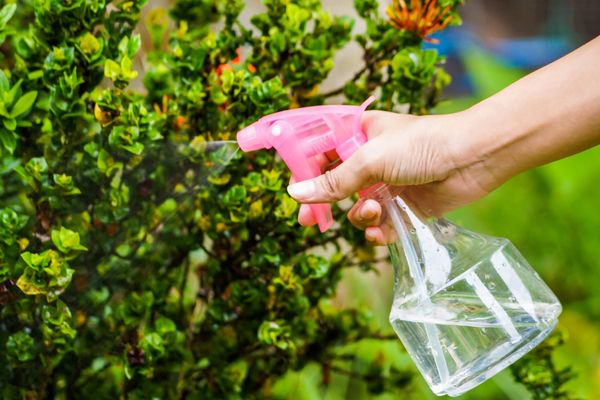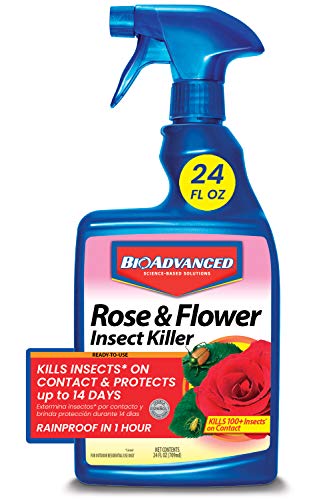Insecticide For Flowering Plants
Different plants attract different pests and, in some cases, different species of the same pest. Boxwoods are attractive to spider mites; crape myrtles are preferred by a specific species of aphid; slugs love hostas; and aphids, thrips, Japanese beetles, and spider mites are drawn to roses. Here are some of the most common pests that can be found feasting on your flowers, roses, and ornamentals.
How to Kill Pests on Your Ornamental Plants
When it comes to killing pests attacking your flowers, roses, trees, and shrubs, you have several options available. To kill pests like aphids, Japanese beetles, and whiteflies on your roses, use Ortho® Insect Killer Rose & Flower Ready-To-Use which keeps killing listed insects for up to 4 months. If you have a problem with spider mites, use Ortho® Insect, Mite & Disease 3-in-1 Ready-To-Use; it controls listed insects, spider mites, as well as wide range of fungal diseases. For larger jobs, use Ortho® Insect Killer Tree & Shrub Concentrate. It kills leaf-feeding beetles, spider mites, thrips, and other listed insects attacking your trees and shrubs. To kill slugs and snails destroying your hostas use Ortho® Bug-Geta® Snail & Slug Killer2. Always check the label before applying any product to find the insects controlled and the plants it can be applied to.

Prevent Future Problems
There are several steps you can take to help reduce future pest problems in your landscape.
-
- Avoid planting varieties that are prone to pest problems. For example, the “indica” types of crape myrtle are more likely to develop aphid problems that other varieties. If you have a problem with Japanese beetle, plant ornamentals they are less likely to attack (boxwood, flowering dogwood, red and silver maples, lilac, juniper, and rhododendron are good examples.)
-
- Keep your plants healthy and vigorous so they can better defend themselves from attack. Stressed plants are more likely to be attacked by pests. Properly care for your plants by providing the right amount of fertilizer (not too little or too much), watering correctly, providing plants with enough space to grow, and making sure they receive adequate sunlight. Spider mites, for example, are more likely to attack plants during periods of hot, dry weather and are less likely to attack plants that are kept well-watered during these periods.
-
- Thoroughly inspect any new plant for insect problems before purchasing it and planting it in your landscape.
-
- Stop small problems from becoming big problems by selectively pruning to remove infested branches or hand-picking off pests. It is best to do this during the cool, early morning hours when pests are less active. You can also spray plants with a forceful stream of water to wash pests like spider mites, scale, and aphids off stems and branches.
-
- Keep the landscape clean by removing leaf litter, excess mulch, piles of stone, debris, and weeds where pests, like slugs and snails, prefer to hide.
- Be careful to keep the good guys in your garden while controlling the bad ones. Not all insects are bad. Ladybugs, praying mantises, minute pirate bugs, and parasitic wasps all attack pests that can damage your plants. Aphids are attacked by ladybugs; parasitic wasps prey on aphids and scale; and black lady beetles, lacewing larvae, minute pirate bugs, and predatory mites attack spider mites. And don’t forget about the bees that help pollinate many of your flowering plants.
Insecticide For Flowering Plants
Insects can be a problem for flower plants. The best way to control them is with insecticide. This can be done by spraying the insecticide on the plant, but it’s better if you use a dusting powder instead.
Dusting Powders are easier to apply than sprays and they stay on the plant longer. They also don’t clog up your sprayer as much as sprays do, which means that they’re easier to get off of your hands when you’re done applying them.
Insecticides containing pyrethrins are effective against aphids and whiteflies. Insecticides containing acephate are effective against caterpillars and other pests such as leafminers.
List Of Insecticide For Flowering Plants
- Controls a wide range of fungal diseases and pests
- Controls aphids, mites, beetles, crickets, weevils, silverfish, caterpillars, whiteflies and other insect pests
- Controls fungal diseases, including black spot, powdery mildew, rust, Scab, blight, brown rot and leaf spot
- Use on roses, flowers, houseplants, ornamental trees and shrubs, fruits, nuts and vegetables
- Convenient, easy to use, requires no mixing
Additional Info :
| Item Dimensions | |
| Height | 8.9 Inches |
| Width | 12 Inches |
| Length | 4.9 Inches |
| Weight | 9 Pounds |
- INSECT KILLER: Kills Aphids, Caterpillars, Whiteflies, Japanese Beetles, and more on contact
- 30 DAY PROTECTION: Protects against listed insects for up to 30 days
- USE ON: Roses, flowers, plants, and even houseplants
- RAINPROOF PROTECTION: Rainproof within 1 hour of application
- COVERAGE AREA: Treats up to 34 plants
- RESTRICTIONS: Restricted in CT, MD, & VT. Not for sale, sale into, distribution, and or use in Nassau, Suffolk, Kings and Queens counties of NY
Additional Info :
| Color | Ready-to-Use |
| Item Dimensions | |
| Height | 11.25 Inches |
| Width | 2.19 Inches |
| Length | 5 Inches |
| Weight | 0.00024 Pounds |
- INSECT KILLER: Kills 100+ insects including Aphids, Caterpillars, Whiteflies, Japanese Beetles, and more
- KILLS ON CONTACT: Kills listed insects on contact
- 14 DAY PROTECTION: Protects against listed insects for up to 14 days
- USE ON: Roses, flowers, plants, and even vegetable gardens
Additional Info :
| Color | White |
| Item Dimensions | |
| Height | 1 Inches |
| Width | 1 Inches |
| Length | 1 Inches |
| Release Date | 2021-11-11T00:00:01Z |
- READY TO USE – These convenient granules are ready for use and provide effective, long lasting insect control for up to 8 weeks in your flower beds, roses, and shrubs. Apply it every 8 weeks throughout the growing season for optimal protection.
- PEST CONTROL – Bonide Systemic Granules kill tough houseplant pests like fungus, gnats, mealybug, whitefly, termite, aphids, and more. Be considerate of animals and bugs like hummingbirds and bees that could be harmed from use of this product.
- NO SPRAYING – There is no mess associated with this pesticide because it is not a spray. The dry-application granules are easy to use, control, and apply without worrying about destroying clothing or other plants.
- FOR NON-EDIBLE PLANTS – This insect killer treatment is not meant for vegetable or fruit plants. This product is labeled for use on flower beds, roses, shrubs, and the like, but it is not labeled for use on any edibles.
- HOW IT WORKS – After incorporating the granules into the soil and watering them in, the pesticide is absorbed by the roots where it moves through the plants to assist in protection against the listed bugs.
Additional Info :
| Item Dimensions | |
| Height | 1 Inches |
| Width | 1 Inches |
| Length | 1 Inches |
| Weight | 1 Pounds |
- CONTAINS BOTANICAL INSECTICIDES: Spray on roses, vegetables, houseplants, ornamentals, trees, shrubs and flowers right up to the day of harvest.
- KILLS ON CONTACT: Kills aphids, tomato hornworms, green fruitworms and other listed insects.
- PROTECTS YOUR WHOLE GARDEN: Use both indoors and outdoors.
- READY-TO-USE PEST CONTROL: Spray upper and lower leaf surfaces – no mixing required.
- APPLY AS NEEDED: Treat weekly or apply as needed to control infestations (up 10 to times per season).
Additional Info :
| Item Dimensions | |
| Height | 10.33 Inches |
| Width | 2.25 Inches |
| Length | 4.25 Inches |
| Weight | 3 Pounds |










